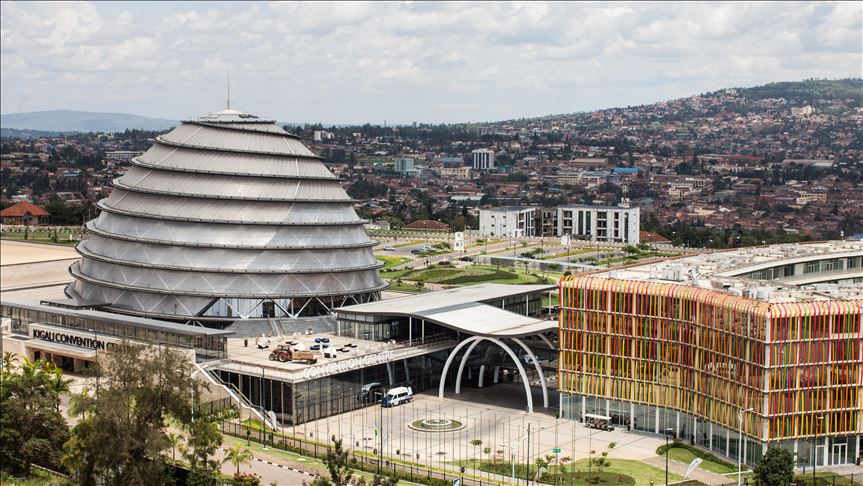 KIGALI, Rwanda
KIGALI, Rwanda
Sub-Saharan Africa’s future is intertwined with technology, which offers great promise for the region’s growth and development across all economic sectors.
At least 239 million people across the region were connected to the internet by the end of 2018, according to a recent report by the Global System for Mobile Communications Association (GSMA), a trade body that represents the interests of mobile network operators worldwide.
“Digital consumers across sub-Saharan Africa are fueling customer growth and driving the adoption of new mobile services needed to empower lives and transform businesses on the continent,” Eugene Kiminine, an information and communication technology (ICT) expert in the Rwandan capital Kigali, told Anadolu Agency.
Up to 483 million people in sub-Saharan Africa, representing nearly 40% of the population, will have mobile internet subscriptions by 2025, according to a report by the GSMA titled “Mobile Economy Sub-Saharan Africa 2019”.
Kiminine underlined that the future of the continent and its economic prosperity would be highly dependent on technology.
One such facet of life in Africa that digitalization has impacted is transportation, where Kiminine said mobile phone apps now make using motorcycle taxis safer and more convenient.
To maintain a good record, motorcycle riders must achieve a rating of at least 90 out of 100.
Technological solutions have also been devised to solve agricultural challenges, Kiminine said, citing Plantheus, an agriculture app which uses artificial intelligence and image recognition to help farmers diagnose crop diseases and recommends best practices for almost all kinds of crop diseases on their farms.
Sub-Saharan Africa’s mobile ecosystem supports around 3.5 million jobs directly and indirectly, and in 2018, it contributed nearly $15.6 billion to the funding of public sector infrastructure projects through consumer and operator taxes, according to the GSMA report.
Africa is prioritizing ICT to achieve a full digital transformation, including affordable and reliable connectivity for all, as well as smart device penetration.
The Rwandan government has, for example, set an ambitious target to achieve digital literacy for all youths aged 16 to 30 by 2024 because of the important role of technology in development.
Kenya recently unveiled a digital economy blueprint for Africa which if adopted would help African countries realize the full potential of the digital transformation.
The blueprint highlights five pillars for the development of a digital economy, including digital infrastructure and the availability of affordable, accessible, resilient and reliable infrastructure and inexpensive internet connectivity for African businesses and households.
“Digital technologies potentially offer great opportunities. Cheap internet connectivity for African businesses and households is key to unlocking the potential of the digital economy,” said Kiminine.
In Kenya, active internet and data subscriptions totaled 42.2 million in 2018, while broadband covers more than 45% of the population, according to official figures.
The presence and use of digital services and platforms can enable speedy public service delivery, said the ICT expert, citing Kenya, where the government has reportedly digitalized more than 200 essential services such as business registration, birth certificates and filing tax returns.
According to the World Bank, in order for digital technologies to benefit everyone everywhere, it requires closing the digital divide, especially in internet access.
The remaining challenge for Africa therefore could be internet connectivity, as more than three-quarters of the population remain offline.
However, Africa50, a pan-African infrastructure investment platform, has launched its Innovation Challenge aimed at helping increase internet access on the continent.
Under the Innovation Challenge, which was launched in May, Africa50 will crowdsource innovative solutions to help increase access to high-speed internet in underserved areas of Africa.
The challenge is open for ICT developers, innovators, engineers and entrepreneurs to submit workable solutions via an online portal to be assessed by the Africa50 investment team and its partners.
Lacina Kone, director general of Smart Africa, the entity that organizes the Transform Africa Summit, said Africa50’s Innovation Challenge is in line with Smart Africa’s vision of developing the continent’s single digital market.
Other experts attest that technology is set to be a game changer for Africa’s development and reducing the income inequality gap on the continent.
Bart Hofker, chief executive of MTN Rwanda, the country’s biggest mobile telecom company, argued that there is a strong correlation between access to connectivity and economic growth and empowerment.
The African Development Bank has projected that two million jobs will be created in the ICT sector in Africa by 2021, including analytical programming, computer networking and jobs for database and system administrators.
Paula Ingabire, Rwanda’s Minister of ICT and Innovation, said her government is implementing the Digital Ambassadors Program, an initiative aimed at increasing the number of digitally literate citizens and accelerating their use of e-government and e-business services.
Rwanda is among the countries on the continent with fast-growing ICT development.
Internet penetration in the country stands at over 52.1% compared with 7% in 2011 while phone penetration has grown to over 80.6% from 33% in 2010, according to the Ministry of ICT and Innovation.
Globally, the International Telecommunications Union estimates that by the end of 2018, around 51.2% of the population, or 3.9 billion people, were using the Internet.
Digital citizenship is a right that we owe to all Africans, and for them to exercise that right, we need to equip them with the necessary skills and put in place an enabling ecosystem, Ingabire said.
CLICK HERE TO COMMENT
